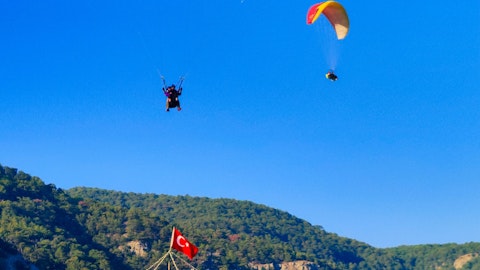Mike Noonan : Yep.
Operator: Thank you. Our next question will come from Ronald Josey of Citi.
Unidentified Analyst: Hi. This is Mike on for Ron. Thanks for taking our question. You mentioned that Viator conversion rates improved due to product improvements. Can you talk a little bit more about what changes in the product drove the improvement there? And maybe what product improvement this any are in the pipeline for Viator in 2023? Thank you.
Mike Noonan : Yeah, I’ll take a quick — give you some thoughts. I know Matt will probably add on to it as well. So — so we’re — the conversion improvements, we’re always experimenting with everything in the funnel, right? And that starts with how we acquire traffic, what we acquire traffic, we’re making a lot of investments in diversifying that — those channels this year as we talked about. We’ve been launching and lagging our way into some brand spend, which is an example of how we’re trying to diversify channel expansion. These are all different ways of improving conversion, finding different pieces of traffic. But then also a lot of the work we’re doing in our app, on our mobile product all about how we orient the users who come in with high intent to the surface and get that traffic to convert. So it really starts up and down the funnel. The type of traffic which we acquire and then product improvements to get people to move into the bookable product.
Matt Goldberg : Yeah, I think that’s right. And so you see the team focusing deeply on matching the post booking experience, making sure our tech platform is as fast and personalized as it can be that we really are paying attention to repeats, which are improving, and we’re seeing cohorts improve. And it’s looking at the kinds of things that create loyalty and create the incentive to repeat. We want to make sure we’re focused on creating more value for operators and so there’s a lot of work going into how we do that through a trusted operator program that really helps them capture opportunities. In the end, it’s about being the default choice and that delivers the scale. It creates more reasons for partners to work with us. It creates more reasons for operators to come. And of course, it creates more reason for consumers to come, get a good experience and return to repeat.
Unidentified Analyst: That’s helpful. Thank you, both.
Operator: Thank you . Our next question will come from Mario Lu of Barclays. Your line is open.
Unidentified Analyst: Hey, this is Jack on for Mario. Thanks for taking my questions. In the shareholder letter, you mentioned that the U.S. recovery in the hotel space was outpacing Europe and the rest of the world. Maybe if you could just talk to us about what drove that and if there was anything notable outside of macro to call out there? And then similarly, you mentioned within trip branded hotels, European recovery rates slowed from last quarter. I’m just curious as to the main drivers of the slowdown as well? Thank you very much.
Mike Noonan : Yeah, Jack, it’s Mike. I’ll take that. So they’re really the same drivers because the meta and the branded hotels are part of that same subsegment. So this is a trend that I think we’ve seen for some time now where U.S. has been recovered in EMEA and rest of the world are just lagging. And I think there’s a lot of what’s in that is really geographic in nature in terms of different recovery rates by geo. Obviously, the U.S. travel general market has recovered at a faster pace than Europe or the rest of the world. Rest of the world being largely APAC. And obviously, that — those areas have been slower to open up travelers than other areas. Europe just simply has had maybe more macro headwind, considering the events there, whether it’s Ukraine War or other impacts of inflation hitting there.
And listen, in the U.S., we’re a well known brand here. We have strong auction dynamics within our core meta and continue to drive good performance here. But I think there’s nothing really else to call out than those main drivers between the regions.
Matt Goldberg : I will also say, as we think about how we reinforce the relevance and performance of meta as we think about how we’re going to leverage data and how we’re going to improve the experience, particularly on mobile to attack the monetization opportunity there. We think there’s an opportunity in international. We know we haven’t served those international audiences in the meta product as well as we may have wanted. And so we think there’s room for improvement, and we think monetization will improve and of course, as those markets come back online, particularly in Asia, we see real opportunities. So excited about that for 2023.
Operator: Thank you. Our next question will come from Jed Kelly of Oppenheimer. Your line is open.
Jed Kelly : Hey, great. Thanks for taking my questions. Just a couple on Viator. As you think around the longer-term strategy of Viator, how do you think about potentially serving some of those longer tail providers that might not need to pay like a higher commission rate? And then can you touch on the performance marketing you’re investing in Tripadvisor Core to drive experiences? And if you were to potentially do a strategic transaction of Viator, would that impact the margins of Viator just because you’re spending some of that performance marketing in Tripadvisor Core experiences? Thank you.
Matt Goldberg : Thanks, Jed. It’s Matt. I’ll take the first, and then I think Mike will take the second part of that question. Look, Viator for the long term, our goal is to win as the leading global experiences marketplace. And the job there is to create a great experience on the demand side and then to bring the supply side on where we do matching that is easy and delivers a great result where the consumer walks away in wonder. And so the opportunity, as we continue to scale is to help everyone on the operating side that is high quality to they get exposure to that audience. And the team is very focused on working with operators to ensure that anyone who has a high-quality experience that they want to deliver in any location can come on to our platform and meet the appropriate demand.
So that concept of leveraging data to do better matching is something that we are very focused on, and that will happen over time. The key is as we continue to scale, we get all kinds of advantages as the leader, and we’re very focused on continuing to accelerate and reinforce that position.
Mike Noonan : Yeah. I’d say on the second question, so experiences on Tripadvisor Core is a great opportunity for us. It’s a very different platform, obviously, than Viator, where people are coming to Viator for very specific booking transaction. Tripadvisor Core has a lot of different traffic that comes to us for very, very different reasons. And part of the opportunity for us, I think, as part of our strategy overlay of how to bring those into monetizable channels. So we do spend performance marketing to attract experiences on Tripadvisor core. And again, I think there’s a huge opportunity for us to continue to find ways to increase that. And as you know, the Viator is the back end that fills the experience itself. So I think the relationship between the two, it’s built on a normal third-party arrangement that — I think your question was if it were separated, that would seem to be in the same realm of that — those economics.
So I wouldn’t think there’d be any really major change because that’s the way we’ve set up the — the way that the intercompany kind of works today.




